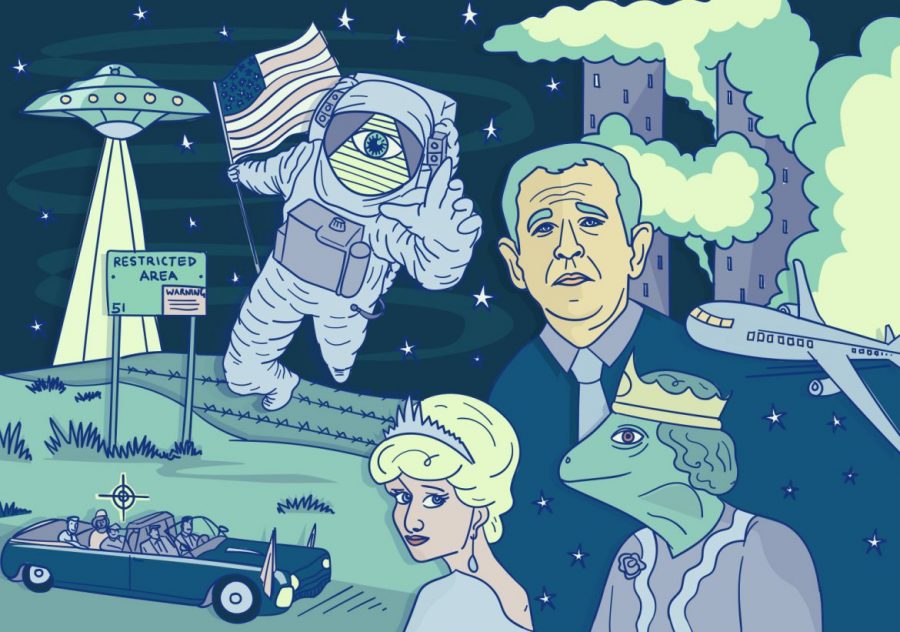The Human Attraction to Conspiracy Theories
October 16, 2020
The moon landing was fake. Area 51 is full of aliens. Bigfoot is a thing. Bush did 9/11. We all have heard these claims from one source or another. In the last decade, people have gotten so creative that there even is a conspiracy theory regarding Queen Elizabeth II, which claims that she is in fact, a lizard. But why? Why? Just why? If you’re anything like me, you have definitely explored multiple theories on Youtube, ranging from the Loch Ness monster to the assassination of JFK. But I had never stopped to consider why. Why is it that we are attracted to such scandalous, dramatized stories? Is there something wrong with us?
To get to the bottom of this, I took a trip back to good old YouTube. As soon as I launched the app, I was bombarded with all these interesting ASMR videos and food reviews. As I was about to stream “The History Of Coffee” by Cogito, a certain video caught my eye. At this moment, I felt that the universe was looking after me because it was titled “The Psychology of Conspiracy Theories.” This video was produced by one of my favorite history/mystery channels, Buzzfeed Unsolved. Obviously, I was not going to completely trust anything that came from the same company that is notorious for random “quirky” quizzes, but some aspects of the video definitely stood out to me. From what I got, the video got its information from the Association for Psychological Science, so I took the liberty to fact-check it. I came to the conclusion that the article was the blueprint of the Buzzfeed video, which Buzzfeed decided to add commentary and examples.
The first reason that was provided in the actual article was called “Epistemic.” This reason is all about humans’ thirst for knowledge—our natural need to understand. It calls to make sense of the situation at hand. For example, our science teachers make us do labs and projects so that we study and examine the situation and make sense of it ourselves, mostly because they know that we won’t really believe it unless we see it ourselves. When we do that, we practice epistemic rationality. It is the same with conspiracy theories. These theories stem from something that there really is no concrete or researched answer. Therefore, people take it upon themselves to try to provide an explanation. Perhaps someone really thinks that somehow the Queen of England is a tall, mutated lizard by—questionable—evidence.
Then, we were introduced to the “Existential” reason. It regards the human instinct to seek fulfillment in safety and control in our environment. I interpreted it as a way to explain the unexplainable, simply for an easy state of mind. It reminded me of the past European practice of scapegoating anyone who wasn’t Christian. The Germans did it, the Spanish did it, the British did it, basically every European colonizer and reformer. If you want to shift the focus back to America, think of 1692 to 1693 New England. During this time, the Puritans sought to execute the numerous Salem witches who were miraculously being reported in dozens at a time. Your crops failed to produce enough income to feed your family? It’s probably your neighbor’s doing, you know, because of the witch items she possesses. The Salem Witch Trials are so interesting to me because they happen to be an example of a conspiracy theory in ‘live time’ AND have conspiracy theories now on why everyone believed it in the past. It’s a perfect example of the “existential” reason.
Lastly, we are given the “Social” reason. The article and video strongly claim that this reason makes the individual seek similar-minded individuals to form a community and bring “positive self-image as well as a social group association,” like the Pumpkin Spice Latte (PSL). There’s really nothing in the coffee that makes it “to kill for.” Nevertheless, huge crowds buy it or criticize it. Regardless of which side an individual chooses, it will be because of a humane fear of missing out. So maybe the reason why loads of people defend a conspiracy theory is because everyone else is doing it. Nobody likes to be the outsider. Therefore, people are forced to choose whether or not to believe their best friend Rick when he informs them of Starbucks’ special ingredient that gives PSL, well, the “hype.”
In the end, I found out two things. The first, which quite beautifully answers my question of whether or not we are sane, is that humans are driven to dramatic explanations by a pressure to explain an event that challenges their comfort through personal conclusions and social interactions; thus birthing the complex web of a conspiracy theory. The second is that Buzzfeed sometimes is a great way to start research—just ignore the rainbow frappuccino review on the queue.
Photo courtesy of CRESTRESEARCH.AC.UK

